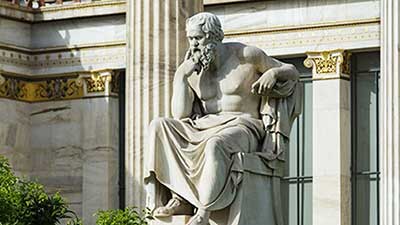As we have been working our way through the book of Acts, we came recently with the Apostle Paul to the city of Athens.
Athens, you may remember, was home to the great philosopher and teacher Socrates. Are you aware that Socrates was sentenced to death by a jury of 500 fellow citizens of Athens? And do you know the charge against him?
Socrates was found guilty of refusing to recognize the gods recognized by the state, and of introducing strange new gods.
When Paul came to Athens he was provoked in his spirit about all the idols in the city. So he began reasoning in the market place and conversing with the philosophers. Some people called him an idle babbler. Others said, “He seems to be a proclaimer of strange gods.”
The very next words in Acts are: “And they took hold of him and brought him to the Areopagus” (17:19). The Areopagus was where the trial of Socrates had been held. And where he was sentenced to die for introducing strange new gods.
Were the people of Athens making a formal inquiry against Paul for proclaiming strange gods, as Socrates had done? Was Paul put before the Council of Athens at the Areopagus? Some think this was the case, and that the inquiry could have easily produced official charges against him—charges which carried the death sentence.
No doubt Paul knew the story of Socrates—of the charges against him, of his trial at the Areopagus, and of his condemnation to death. I feel certain the parallels between himself and Socrates were not lost on Paul.
So how did Paul respond when he was put before the Council at the Areopagus? His message was winsome and polite, but he didn’t water down the gospel. He boldly proclaimed the non-state-approved Jesus, His resurrection, and His coming judgment. And he even threw shade on their city full of state-recognized gods: “God does not dwell in temples made with hands” (17:24); “He is not like an image formed by the art and thought of man” (17:29).
Was he staring down a possible death sentence before the Council? Perhaps. But if these were to be his final words they would be about Jesus.
May we be so bold!
